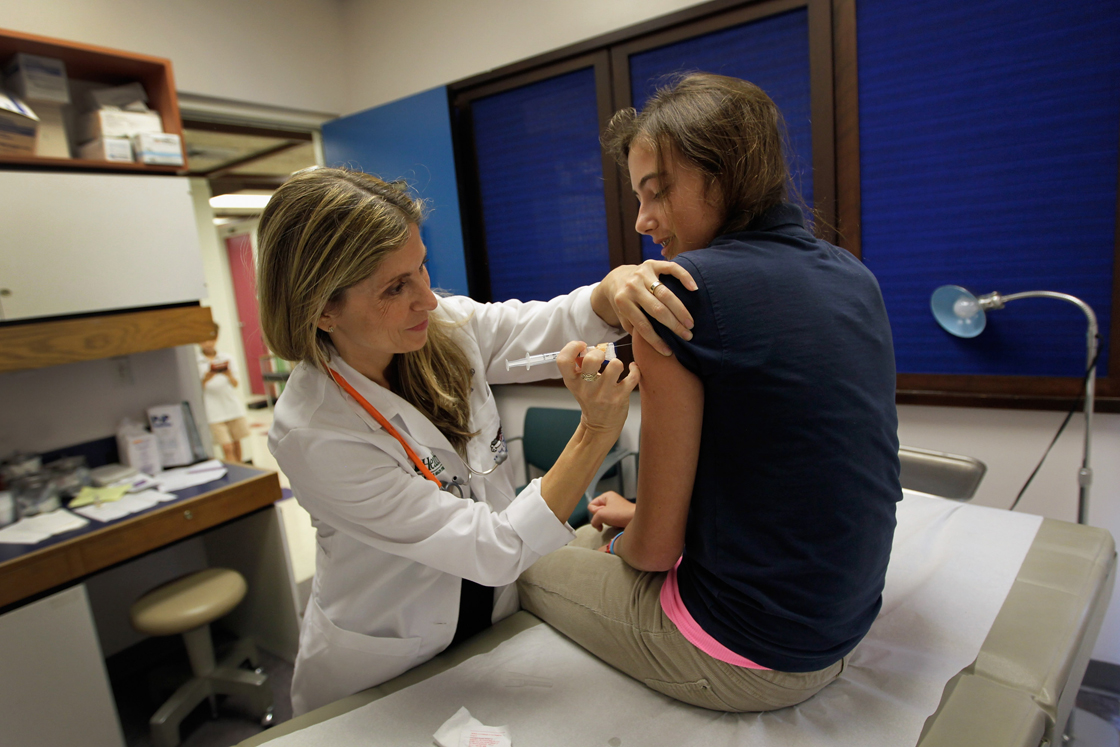TORONTO — New research out of the University of British Columbia suggests that young girls in Canada could be faring just as well with two doses of HPV vaccine instead of the routine three.

Eliminating one of the doses could save money — the price tag on the treatment is on the steeper end — and free up resources, such as nurses doing their rounds immunizing the children.
In countries without HPV vaccination programs, removing a third dosage could allow them to consider implementing universal access to the medical, which keeps cervical cancer away.
In the past few years, two vaccines have come to market, offering protection against human papillomaviruses, which cause cervical cancer, head and neck cancers and genital warts.
“That’s probably one of the most significant possibilities: the countries that don’t have cervical cancer screening programs, like Pap test screenings, would have the vaccine as the best way to control cervical cancer,” lead researcher, Dr. Simon Dobson told Global News.
“Giving just two doses of the vaccine, it’s possible that then it’s affordable enough that they could start programs,” he said.
Cervical cancer is the second most common cause of cancer death in women.
Read more: New cervical cancer screening guidelines recommend testing every 3 years
Dobson presented his findings Tuesday at a Journal of American Medical Association briefing Tuesday.
He works in at B.C. Children’s Hospital and the Vaccine Evaluation Centre, which is part of UBC. There, Dobson studies vaccines and their value.

Get weekly health news
“Research in vaccines isn’t just up to the point at which they get introduced, it’s also to make sure you’re getting what you hope to get out of the vaccine,” Dobson said.
“They’re expensive — you want to know that society’s getting good value out of the vaccine program.”
He says that if a patient had a prescription for the HPV treatment, it’d be more than $150 per dosage. Other research has pegged the three injections at about $500. It’s easily more expensive than other vaccines doled out during childhood.
In this instance, Dobson and his team compared 830 girls who received different dosages of the vaccine.
In Canada, provinces and territories offer the vaccine free to girls. Right now, HPV vaccination programs are rolled out in various ways across the country.
Read more: Doctors calling for increase in male HPV vaccinations
In B.C., for example, the program begins in grade 6, and 11 year olds are vaccinated at once, then again six months later and finally at the three-year mark.
Meanwhile, in Quebec, girls as young as nine years old are vaccinated once, again at the six month mark and finally five years later, Dobson said.
The conventional schedule is a first injection, a second two months later, and a third final dosage at six months.
Dobson sought to consider if the second immunization made a difference in protecting girls.
Analyzing blood tests, he compared antibody levels in 830 subjects from August 2007 through to February 2011.
One batch of nine to 13 year olds received all three doses, while another received only two. An older group of young women — 16 to 26 — received three doses.
Results showed that only two doses in the girls was no worse than the three doses in the young women up to 26 years old. That effect waned compared to the girls who got three doses by the three-year mark.
Still, Dobson said his findings mark the first step in further researching the possibility of eliminating the third dosage.
He’s already working on a 10-year study with girls from B.C., Alberta, Quebec and Nova Scotia.
Dobson said he’ll be looking into how long protection of two doses will last, and he hopes to compare the different HPV vaccination programs from coast to coast and how they affect defence against the virus.
“It’s a start but until we answer these other questions, (two doses) may not be widely taken up,” Dobson said.
Read more: P.E.I. extends HPV vaccine program to boys
HPV vaccination programs exist across most of the developed world, but isn’t in place in poor countries: most of sub-Saharan Africa, China, and India, for example.
Dobson noted that other treatment programs, such as hepatitis B, have scaled back on dosages following sound evidence.
carmen.chai@globalnews.ca








Comments